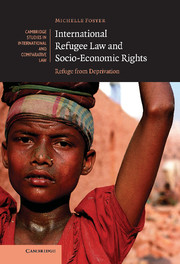Book contents
- Frontmatter
- Contents
- Acknowledgements
- Table of cases
- Table of treaties and other international instruments
- List of abbreviations
- 1 Introduction
- 2 A human rights framework for interpreting the refugee convention
- 3 Persecution and socio-economic deprivation in refugee law
- 4 Rethinking the conceptual approach to socio-economic claims
- 5 Economic deprivation as the reason for being persecuted
- 6 Economic disadvantage and the Refugee Convention grounds
- 7 Conclusions
- Bibliography
- Index
- CAMBRIDGE STUDIES IN INTERNATIONAL AND COMPARATIVE LAW
5 - Economic deprivation as the reason for being persecuted
Published online by Cambridge University Press: 21 July 2009
- Frontmatter
- Contents
- Acknowledgements
- Table of cases
- Table of treaties and other international instruments
- List of abbreviations
- 1 Introduction
- 2 A human rights framework for interpreting the refugee convention
- 3 Persecution and socio-economic deprivation in refugee law
- 4 Rethinking the conceptual approach to socio-economic claims
- 5 Economic deprivation as the reason for being persecuted
- 6 Economic disadvantage and the Refugee Convention grounds
- 7 Conclusions
- Bibliography
- Index
- CAMBRIDGE STUDIES IN INTERNATIONAL AND COMPARATIVE LAW
Summary
A desire to achieve a better life or for economic improvement cannot of itself justify asylum. Nevertheless, the line between the need to escape persecution which results in penury and economic migration is often difficult to draw.
United Kingdom's Immigration Appeal Tribunal, 2001.The question is not, of course, whether they are economic migrants but whether they fall within the Convention.
United Kingdom's Immigration Appeal Tribunal, 1998.Introduction
This chapter turns to consider the second of those aspects of the refugee definition that present the most formidable obstacles to successful applications based on violations of economic and social rights, namely the question of when persecution can properly be characterized as being ‘for reasons of ’ a Refugee Convention ground – race, nationality, religion, political opinion or membership of a particular social group.
In addition to invoking existing controversies inherent in this aspect of the definition, including the degree of causal connection required to satisfy the nexus (‘for reasons of ’) clause, as well as the appropriate interpretation of the malleable and wide notion of ‘membership of a particular social group’, claims involving economic and social rights also challenge decision-makers to examine the wider societal context of poverty and inequality in analysing the underlying or complex explanation for a person's predicament, rather than merely focusing on the immediate explanatory factor for the person's fear of harm.
This chapter addresses the multifaceted issues raised in the jurisprudence pertaining to nexus, as related to claims based on violations of socio-economic rights.
- Type
- Chapter
- Information
- International Refugee Law and Socio-Economic RightsRefuge from Deprivation, pp. 236 - 290Publisher: Cambridge University PressPrint publication year: 2007



